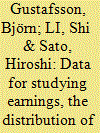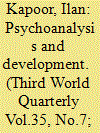|
|
|
Sort Order |
|
|
|
Items / Page
|
|
|
|
|
|
|
| Srl | Item |
| 1 |
ID:
136278


|
|
|
|
|
| Summary/Abstract |
Knowledge of poverty prevalence is essential for any society concerned with improving public welfare and reducing poverty. In this paper, we estimate and compare poverty incidence rates in China using four nationally representative surveys: the China Family Panel Studies (CFPS) of 2010, the Chinese General Social Survey (CGSS) of 2010, the China Household Finance Survey (CHFS) of 2011, and the Chinese Household Income Project (CHIP) of 2007. Using both international and official domestic poverty standards, we show that poverty rates at the national, rural, and urban levels based on the CFPS, CGSS, and the CHFS are all much higher than the official estimates and those based on the CHIP. This study highlights the importance of using independent datasets to verify official statistics of public and policy concern in contemporary China.
|
|
|
|
|
|
|
|
|
|
|
|
|
|
|
|
| 2 |
ID:
137000


|
|
|
|
|
| Summary/Abstract |
This article is largely based on historical analysis of an overlooked and unexplored colonial document. The Sir James Clark Enquiry of 1868, conducted by the Government of India, contains rich evidence of the mindset of policymakers and those who implemented colonial psychiatry in 14 institutions. While the state regarded the asylum system as burdensome, it made ample efforts to sequester the insane. In view of such ambivalence, the article scrutinises the relationship between colonialism and psychiatry, and also probes some reasons behind the state’s inability to establish superior-quality asylums in India. The findings throw new light on the limited colonial agenda of psychiatry in India, highlighting the basically punitive nature of psychiatric infrastructures, linked with attempts to create an ordered society, but above all to minimise costs.
|
|
|
|
|
|
|
|
|
|
|
|
|
|
|
|
| 3 |
ID:
134878


|
|
|
|
|
| Summary/Abstract |
This paper discusses data used in publishing statistics on earnings, the distribution of household income and poverty in China by the National Bureau of Statistics (NBS) which is widely used by policy makers, international agencies and researchers. Unlike many other countries, China until recently had a dual system of household surveys — one rural and one urban. This has had consequences for providing official data on wages, income and poverty which we discuss along with other challenges. Since the end of the 1980s, researchers have been active in the construction of large databases aimed at mapping earnings, household income and poverty, and we present seven of these in the paper.
|
|
|
|
|
|
|
|
|
|
|
|
|
|
|
|
| 4 |
ID:
134565


|
|
|
|
|
| Summary/Abstract |
The development remix, a project initiated at Georgetown University, is a six- to eight-minute-long digital narrative that mixes or edits existing literary or audiovisual representations. The remix project enables development students, scholars, and practitioners to prepare their own narratives about the developing world, through experiencing existing narratives closely, and makes them empathic and critical while humanizing the cultural conditions of poverty in the developing world. The digital remix also actively engages scholars and practitioners with audiovisual representations, rather than as silent observers or readers of fictional texts and visual dramas. After a brief conceptualization on circulation of narratives about the developing world, the article presents the remix technique for the development scholar. The remix is, in effect, a translation with several strengths: it foregrounds the remixer's reflexivity, humanizes the conditions in the developing world, locates voice and agency in development narratives, and presents all narratives as culturally hybrid. These issues have been the subject of not just development research but also social sciences in general, especially on the use of films and fiction in pedagogic practices. Therefore, the usefulness of preparing remixed narratives extends beyond international development studies.
|
|
|
|
|
|
|
|
|
|
|
|
|
|
|
|
| 5 |
ID:
137070


|
|
|
|
|
| Summary/Abstract |
African cotton has been an engine of immiseration. On this the historic record is clear. Since 2002 development policy and decision makers have attempted to treat aspects of this unwelcome condition by focusing official poverty-reduction efforts more explicitly on cotton. While these anti-poverty palliatives have doubtless been well-warranted, the preferred poverty pain relievers have under-performed. This article argues that poverty reduction efforts undertaken for African cotton at multiple levels over the past 13 years have been overly infused with neoliberal ideas. Many experts have simply not cottoned on to the possibility that prescriptions steeped in neoliberal predispositions might only alleviate some of the symptoms that their African ‘patients’ experience every day. In this context status quo poverty reduction initiatives come at a high potential risk and cost. Absent a rethink, in this case the poverty of ‘poverty reduction’ could well be cemented.
|
|
|
|
|
|
|
|
|
|
|
|
|
|
|
|
| 6 |
ID:
134636


|
|
|
|
|
| Summary/Abstract |
International development has tended to ignore – or, tellingly, repress – human/social passions. Yet the theory and practice of development is replete with disavowed memories (racism, (neo)colonialism, gender discrimination) and traumatic prohibitions (economic recession, poverty), which show up in dreams and fantasies (the exoticised Third World, structural adjustment as universal panacea), obsessions (economic growth, ‘wars’ against poverty or terror), or stereotypes (denigration, infantilisation, sexualisation or feminisation of the Third World Other). Psychoanalysis aims precisely at helping tease out these passions, that is, the unconscious fantasies and desires embedded in development. It helps explain the gap between development’s scientific commitments (eg belief in progress, neutrality, objectivity, rationality) and its irrational practices (eg the seductive draw of narrow capitalistic growth, the fatal pull to aggressive racism, or the blind conformity to bureaucratic procedures or ethnic/religious identities). It helps us understand that development is not only a socioeconomic construction, but also an ideological construction intent on effacing its various internal traumas and contradictions – for example, the way in which development is “naturally” equated with neoliberal growth and liberal democracy, concealing the reality of rapacious capitalism, growing global inequalities and unevenness, and diminishing avenues for political contestation. The five articles in this sub-theme for Third World Quarterly aim to examine the intersection of psychoanalysis and development, applying in particular (although not exclusively), a Lacanian/Žižekian lens to a range of development issues.
|
|
|
|
|
|
|
|
|
|
|
|
|
|
|
|
| 7 |
ID:
134233


|
|
|
|
|
| Summary/Abstract |
In a cinder-block building at the end of a narrow, washed-out dirt road, Alberto Cruz, the mayor of Amapala, wipes the sweat from under his white baseball cap. The July heat is oppressive, and beads of moisture form as Cruz faces the insistent stares of hundreds of his constituents, gathered for a town-hall meeting. People fill the small room before him and spill out into an adjacent, dusty lot, peering in through metal window screens. They are eager to pepper him with questions about a provocative new law that could change their lives permanently.
The coast of Honduras could be the site of a radical experiment: one in which foreign
investors bankroll a quasi-sovereign city. Backers say it will lift the region out of poverty -- but residents are anything but convince
|
|
|
|
|
|
|
|
|
|
|
|
|
|
|
|
|
|
|
|
|